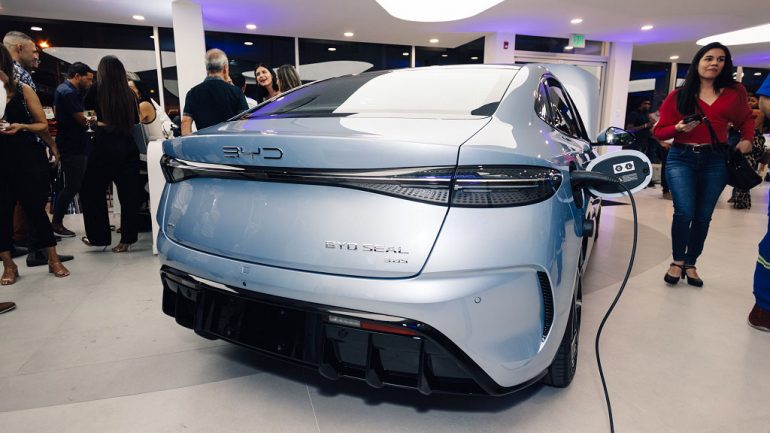
The American auto industry is increasingly apprehensive about a potential influx of low-cost electric vehicles (EVs) from China, facilitated through manufacturing operations in Mexico. Leveraging the North American trade agreements, Chinese automakers could flood the U.S. market with these affordable EVs, posing a significant threat to domestic manufacturers.
Currently, the average price of an American-made EV stands at approximately $55,000, which is almost double the cost of Chinese EVs. This stark price disparity could result in significant market disruption. As a consequence, U.S. EV manufacturers might struggle to compete, potentially leading to factory closures and job losses across the American industrial heartland. This scenario echoes past instances where Chinese government-subsidized products, such as steel and solar equipment, severely impacted American industries.
Also, don’t forget that you can get discounted new car pricing with a free quote through qualified local dealer partners.
Senator Sherrod Brown of Ohio has voiced strong opposition to this potential threat, calling for a ban on Chinese EVs in the U.S. He emphasized the historical pattern of China dumping subsidized goods into foreign markets to undercut domestic industries. The Alliance for American Manufacturing has similarly warned that the arrival of low-cost Chinese EVs could be an “extinction-level event” for the U.S. auto sector.
The trade framework enabling this potential influx is the U.S.-Mexico-Canada Agreement (USMCA), enacted in 2020. Under this agreement, vehicles assembled in Mexico can enter the U.S. either duty-free or at a minimal tariff rate. This provision could allow Chinese EVs to enter the U.S. at significantly lower prices compared to domestic models.
To counter this threat, the U.S. has several options. Customs officials could rule that Chinese EVs assembled in Mexico do not qualify for duty-free benefits. Alternatively, the U.S. could pressure Mexico to exclude Chinese vehicles or invoke national security concerns to bar these EVs from entering the U.S.
Former President Donald Trump has proposed a 100% tariff on Chinese EVs to protect American manufacturers. However, any government measures to restrict Chinese EV imports would likely face legal challenges from companies seeking to benefit from the lower prices.
The timing of this threat is particularly problematic for U.S. automakers, who are already grappling with slow EV sales despite significant investments. High prices and concerns about charging infrastructure have dampened consumer enthusiasm for EVs in the U.S. On the other hand, some experts argue that the availability of low-cost Chinese EVs could boost overall EV adoption and investment in necessary infrastructure.
China currently leads the global EV market, producing nearly 62% of the world’s battery-powered EVs. The U.S., by comparison, accounts for less than 10%. Chinese automakers like BYD have achieved cost efficiencies through substantial government subsidies, allowing them to offer competitively priced models such as the $12,000 Seagull.
U.S. policymakers and automakers remain cautious about the competitive edge Chinese EVs might have, citing faster development cycles and significant government support. Ford Motor’s CFO John Lawler has highlighted the competitive threat posed by Chinese EV manufacturers, who can develop new models much quicker than their U.S. counterparts.
The U.S. has responded with measures to curb the influx of Chinese EVs, such as raising tariffs to 102.5%. However, the USMCA complicates this effort by potentially allowing Chinese EVs assembled in Mexico to bypass these tariffs. Meeting the agreement’s requirements, such as sourcing 75% of parts from North America and ensuring certain labor standards, remains a challenge for many automakers, including Chinese ones.
Trade experts suggest that blocking Chinese EVs on national security grounds could be the most effective strategy. Concerns about the potential for these vehicles to be used for espionage or other security risks have been raised, with President Biden ordering investigations into the technology used in Chinese smart cars.
Ultimately, the U.S. may leverage its significant influence over Mexico, its primary export market, to prevent Chinese EV investments. Additionally, the upcoming review of the USMCA in 2026 provides an opportunity to negotiate new terms that could further restrict Chinese EVs.
In this evolving landscape, the future of the U.S. auto industry and its ability to compete in the global EV market remain uncertain. The resolution of these trade and security issues will significantly impact the trajectory of EV adoption and manufacturing in America.
Source: Associated Press